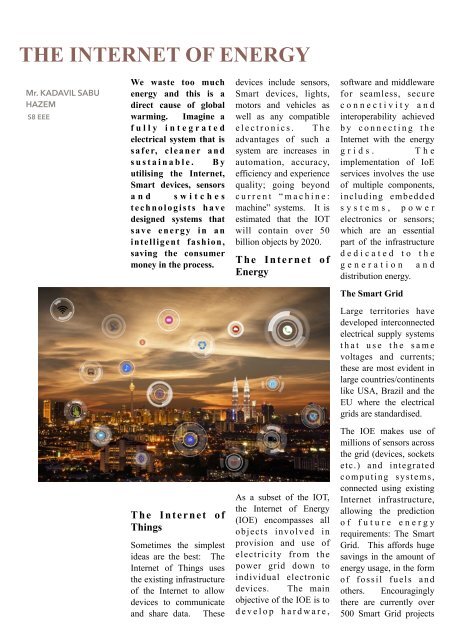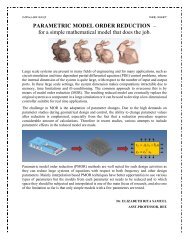combinepdf
Create successful ePaper yourself
Turn your PDF publications into a flip-book with our unique Google optimized e-Paper software.
CARBON NANOTUBES AND ITS<br />
FUTURE IN TAPPING SOLAR ENERGY<br />
Mr.SIDHARTH R.S.<br />
S8 EEE<br />
We waste too much With<br />
the increasing concern<br />
about the carbon dioxide<br />
concentration and global<br />
warming in the earth, as<br />
well as the increasing<br />
demand on energy and<br />
the limitation of fossil<br />
f u e l s r e s o u r c e s ,<br />
researches have been<br />
addressed towards other<br />
energy alternatives such<br />
a s t h e a m a z i n g<br />
sustainable source of<br />
energy, the sun. It has<br />
been calculated that less<br />
than one hour of sun<br />
energy received by the<br />
earth is enough to satisfy<br />
the annual world human<br />
demand of energy. The<br />
solar energy is clean,<br />
abundant and without<br />
any harmful effects on<br />
the environment. The<br />
photovoltaic effect is the<br />
process allowing the<br />
conversion of light into<br />
electricity, this process<br />
needs semiconductors<br />
materials in order to<br />
convert the photons into<br />
e l e c t r o n s . T h e<br />
photovoltaic solar cell<br />
technology with its<br />
different generations is a<br />
multidisciplinary field<br />
i n v o l v i n g c l a s s i c a l<br />
disciplines like physics,<br />
chemistry and materials<br />
sciences, beside new<br />
emerging technologies<br />
such as optoelectronics,<br />
organic electronics and<br />
nano electronics. These<br />
technologies have been<br />
tremendously expanded<br />
in the last decades,<br />
serving the development<br />
of photovoltaic solar<br />
cells and making the<br />
field rich and attracting<br />
f o r s e v e r a l f a m o u s<br />
worldwide universities,<br />
institutes and research<br />
centres.<br />
A solar cell (photovoltaic<br />
cell) is a solid state<br />
electrical device that<br />
converts the energy of<br />
l i g h t d i r e c t l y t o<br />
e l e c t r i c i t y b y<br />
photovoltaic effect. The<br />
solar cells of today are<br />
typically made of silicon,<br />
a n i n o r g a n i c<br />
semiconductor material<br />
k n o w n b y i t s<br />
environmental stability,<br />
high purity and its<br />
distinguished charge<br />
transport properties. The<br />
silicon solar cells are<br />
d o m i n a t i n g t h e<br />
Photovoltaic market<br />
thanks to their high<br />
p o w e r c o n v e r s i o n<br />
efficiency which hits<br />
25% as per the latest<br />
report. In spite of its<br />
market dominance and<br />
high conversion rates,<br />
fabrication of silicon<br />
s o l a r c e l l s i s<br />
complicated, expensive<br />
and energy-intensive<br />
leading to a costly<br />
manufacturing. The lack<br />
of a cost-effective energy<br />
in the inorganic solar cell<br />
technology has been one<br />
of the major drawbacks<br />
t h a t i n c r e a s e d<br />
i n v e s t i g a t i o n s o n<br />
a l t e r n a t i v e s a n d<br />
promoted organic solar<br />
cells researches. An<br />
organic solar cell or<br />
plastic solar cell is a type<br />
of photovoltaic that uses<br />
organic electronics, a<br />
branch of electronics that<br />
deals with conductive<br />
organic polymers or<br />
small organic molecules,<br />
for light absorption and<br />
charge transport to<br />
produce electricity from<br />
s u n l i g h t b y t h e<br />
photovoltaic effect. The<br />
o r g a n i c s o l a r c e l l<br />
technology is now a<br />
d a y s , a p r o m i s i n g<br />
competitive alternative of<br />
the inorganic solar cell<br />
technology, specifically<br />
in terms of fabrication<br />
simplicity, cost and also<br />
its ability to bend allows<br />
it to be used in areas<br />
where inorganic solar<br />
cells can’t be used.While<br />
working on organic cells,<br />
researchers were struck<br />
with a basic theory. If<br />
organics involve the use<br />
o f c a r b o n a n d i t s




